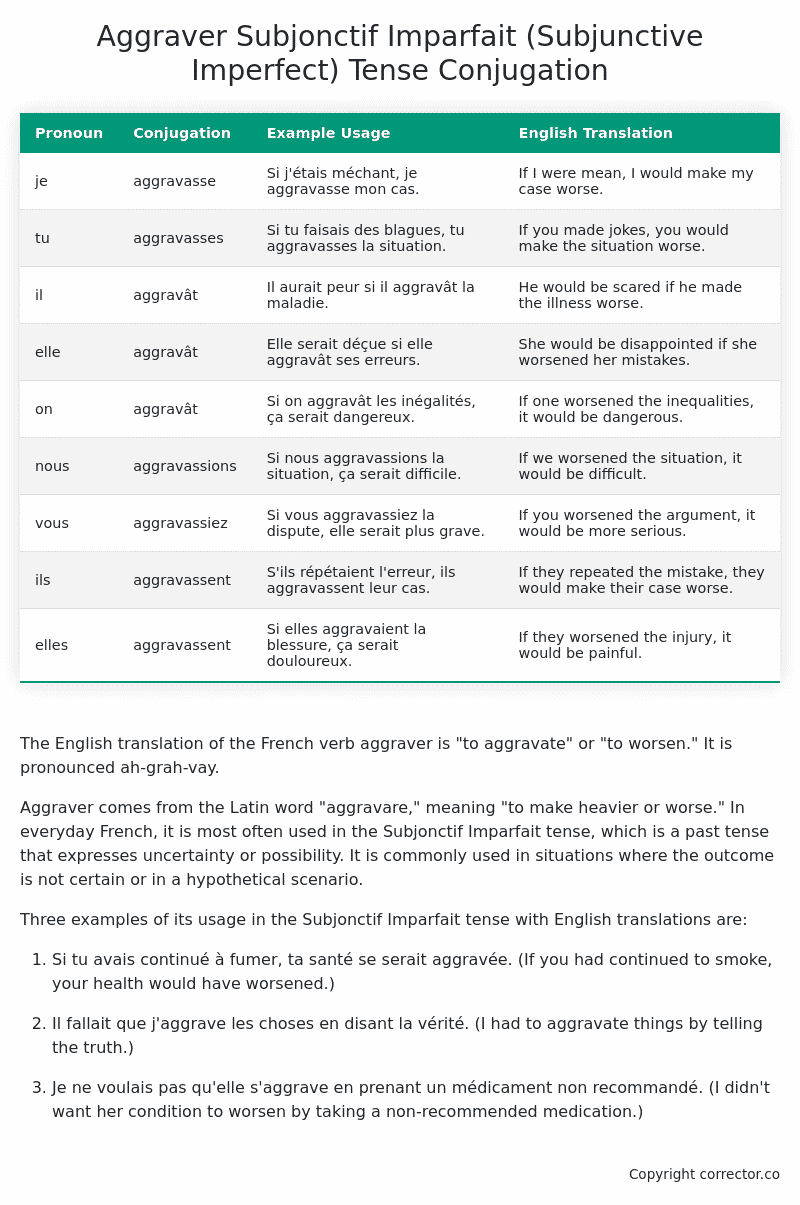Subjonctif Imparfait (Subjunctive Imperfect) Tense Conjugation of the French Verb aggraver
Introduction to the verb aggraver
The English translation of the French verb aggraver is “to aggravate” or “to worsen.” It is pronounced ah-grah-vay.
Aggraver comes from the Latin word “aggravare,” meaning “to make heavier or worse.” In everyday French, it is most often used in the Subjonctif Imparfait tense, which is a past tense that expresses uncertainty or possibility. It is commonly used in situations where the outcome is not certain or in a hypothetical scenario.
Three examples of its usage in the Subjonctif Imparfait tense with English translations are:
-
Si tu avais continué à fumer, ta santé se serait aggravée. (If you had continued to smoke, your health would have worsened.)
-
Il fallait que j’aggrave les choses en disant la vérité. (I had to aggravate things by telling the truth.)
-
Je ne voulais pas qu’elle s’aggrave en prenant un médicament non recommandé. (I didn’t want her condition to worsen by taking a non-recommended medication.)
Table of the Subjonctif Imparfait (Subjunctive Imperfect) Tense Conjugation of aggraver
| Pronoun | Conjugation | Example Usage | English Translation |
|---|---|---|---|
| je | aggravasse | Si j’étais méchant, je aggravasse mon cas. | If I were mean, I would make my case worse. |
| tu | aggravasses | Si tu faisais des blagues, tu aggravasses la situation. | If you made jokes, you would make the situation worse. |
| il | aggravât | Il aurait peur si il aggravât la maladie. | He would be scared if he made the illness worse. |
| elle | aggravât | Elle serait déçue si elle aggravât ses erreurs. | She would be disappointed if she worsened her mistakes. |
| on | aggravât | Si on aggravât les inégalités, ça serait dangereux. | If one worsened the inequalities, it would be dangerous. |
| nous | aggravassions | Si nous aggravassions la situation, ça serait difficile. | If we worsened the situation, it would be difficult. |
| vous | aggravassiez | Si vous aggravassiez la dispute, elle serait plus grave. | If you worsened the argument, it would be more serious. |
| ils | aggravassent | S’ils répétaient l’erreur, ils aggravassent leur cas. | If they repeated the mistake, they would make their case worse. |
| elles | aggravassent | Si elles aggravaient la blessure, ça serait douloureux. | If they worsened the injury, it would be painful. |
Other Conjugations for Aggraver.
Le Present (Present Tense) Conjugation of the French Verb aggraver
Imparfait (Imperfect) Tense Conjugation of the French Verb aggraver
Passé Simple (Simple Past) Tense Conjugation of the French Verb aggraver
Passé Composé (Present Perfect) Tense Conjugation of the French Verb aggraver
Futur Simple (Simple Future) Tense Conjugation of the French Verb aggraver
Futur Proche (Near Future) Tense Conjugation of the French Verb aggraver
Plus-que-parfait (Pluperfect) Tense Conjugation of the French Verb aggraver
Passé Antérieur (Past Anterior) Tense Conjugation of the French Verb aggraver
Futur Antérieur (Future Anterior) Tense Conjugation of the French Verb aggraver
Subjonctif Présent (Subjunctive Present) Tense Conjugation of the French Verb aggraver
Subjonctif Passé (Subjunctive Past) Tense Conjugation of the French Verb aggraver
Subjonctif Imparfait (Subjunctive Imperfect) Tense Conjugation of the French Verb aggraver (this article)
Subjonctif Plus-que-parfait (Subjunctive Pluperfect) Tense Conjugation of the French Verb aggraver
Conditionnel Présent (Conditional Present) Tense Conjugation of the French Verb aggraver
Conditionnel Passé (Conditional Past) Tense Conjugation of the French Verb aggraver
L’impératif Présent (Imperative Present) Tense Conjugation of the French Verb aggraver
L’infinitif Présent (Infinitive Present) Tense Conjugation of the French Verb aggraver
Struggling with French verbs or the language in general? Why not use our free French Grammar Checker – no registration required!
Get a FREE Download Study Sheet of this Conjugation 🔥
Simply right click the image below, click “save image” and get your free reference for the aggraver Subjonctif Imparfait tense conjugation!

Aggraver – About the French Subjonctif Imparfait (Subjunctive Imperfect) Tense
Formation
Common Everyday Usage Patterns
Interactions with Other Tenses
Subjonctif Présent
Indicatif Passé Composé
Conditional
Conditional Perfect
Summary
I hope you enjoyed this article on the verb aggraver. Still in a learning mood? Check out another TOTALLY random French verb conjugation!


